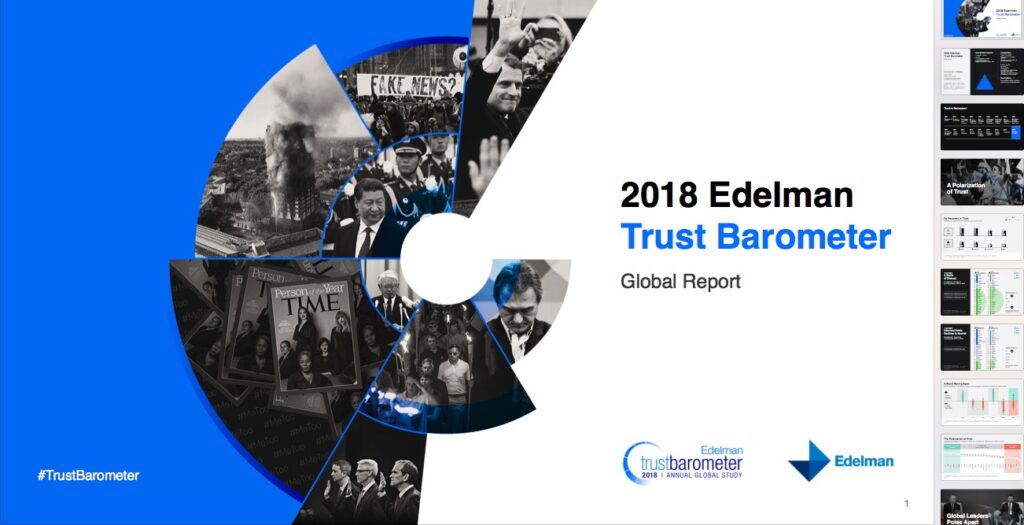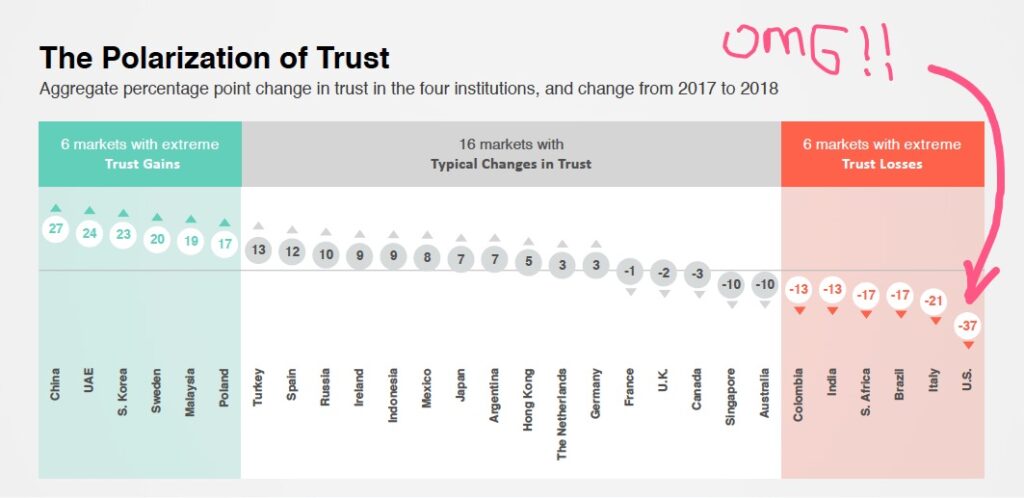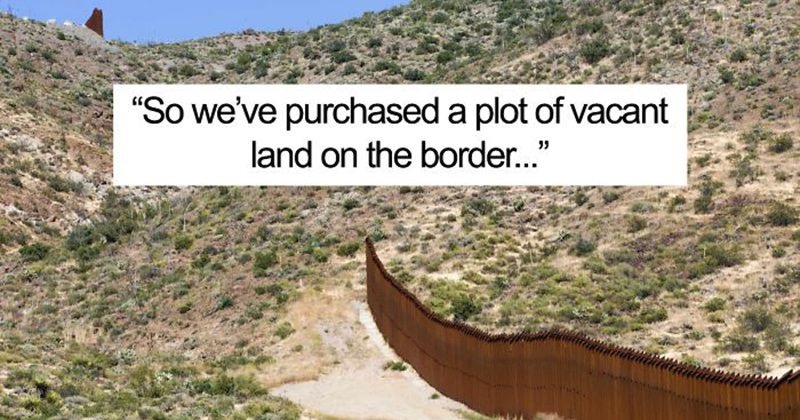I was speaking to a friend and marketing consultant Alan McKenna last week about the changes that have been rocking the online business world. He said he noticed things starting to shift around mid-2016 — right about the time he married his wife.
He said it was like, “Who moved my cheese.” He woke up and things were just… different.
Alan has been the secret weapon behind some of the top online entrepreneurs in our industry – T. Harv Eker, John Assaraf, Lisa Sasevich, Lisa Nichols, and many more – for over a decade… so he’s been around and he knows what he’s talking about.
He asked me what my take was on the changes. I mentioned a few things about email deliverability, market sophistication, and declining trust… but I didn’t have a clear explanation — until now.
This weekend I tucked into the 2018 Edelman Trust Barometer – a widely-respected annual study of 33,000 people in 28 countries — and discovered that trust in peers, search and social have declined substantially, reversing the trend over the last few years where trust had shifted to peer-to-peer discussion.
Yup, that means prospects, friends and associates trust you less today than they did yesterday.
A scary thought… but is it?
This declining trust in peers goes hand-in-hand with a spike in trust in experts, journalists and CEOs.
In other words, people are starting to realize that everything their friends say, everything they read on Facebook and everything they find on Google is not necessarily true. Hallelujah!
The challenge is a phenomenon known as Gresham’s Law, “based on the 18th-century observation that debased currency drives out the good, is now evident in the realm of information, with fake news crowding out real news.”
I would argue that Gresham’s law also applies to products and business.
Over the last year or so, I’ve watched bad products crowding out good products.
And take-the-most-give-the-least business owners and service providers crowding out the real deal entrepreneurs.
“No market saw steeper declines than the United States, with a 37-point aggregate drop in trust across all institutions.”
That’s the biggest drop in trust that Edelman has even seen since it started this study 18 years ago. The reason is that people don’t know who — or what — to believe.
“As we begin 2018, we find the world in a new phase in the loss of trust: the unwillingness to believe information, even from those closest to us.”
It can be hard for the average person to tell the real from the fake: “Globally, nearly seven in 10 respondents among the general population worry about fake news or false information being used as a weapon, and 59 percent say that it is getting harder to tell if a piece of news was produced by a respected media organization.”
“Confusion about the credibility of news is connected to the broad, wide definition of media that Trust Barometer respondents now hold. Some people consider platforms to be part of “the media” — including social media (48 percent) and search engines (25 percent) — alongside journalism (89 percent), which includes publishers and news organizations.
At the same time, voices of expertise are now regaining credibility. Journalists have risen 12 points, and CEOs recorded a seven-percentage point gain, since 2017. Technical experts, financial industry analysts, and successful entrepreneurs now register credibility levels of 50 percent or higher.”
People are starting to turn back to experts they trust for information: “People have retreated into self-curated information bubbles, where they read only that with which they agree, as if selecting their playlist for music…”
“In a world where facts are under siege, credentialed sources are proving more important than ever,” said Stephen Kehoe, Global chair, Reputation. “There are credibility problems for both platforms and sources. People’s trust in them is collapsing, leaving a vacuum and an opportunity for bona fide experts to fill.
So how do you fill this vacuum without adding to the distrust and misinformation?
First of all, lead with real facts and expertise. Do diligence. People no longer believe big promises and claims unless they’re grounded in proven solutions and methodologies. Being a likable peer is no longer enough, you have to become a trusted expert while still maintaining the informal, conversational style of a peer.
Second, recognize that standards for your products and even your free information and marketing are getting higher every day. Take great care with everything you put out. People are faster to judge and disqualify you.
Your audience has been burned too many times and they’re hesitant to trust. Right or wrong, they’re looking for ways to discredit and disqualify you from their “self-curated information bubbles”. It’s not personal, it’s the reality of today’s market conditions.
Third, use your platform to speak out and speak up:
“Business is now expected to be an agent of change… Nearly two-thirds of respondents say they want CEOs to take the lead on policy change instead of waiting for government, which now ranks significantly below business in trust in 20 markets. This show of faith comes with new expectations; building trust (69 percent) is now the No. 1 job for CEOs, surpassing producing high-quality products and services (68 percent).”
There is no better way to gain trust than to take a stand. Dare to believe in something… and share your beliefs.
Cards Against Humanity got huge props recently from buying land on the U.S./Mexican border in an attempt to block Trump from building his wall.
Remember: Your business is part of the larger social and political dialogue and your audience wants to see that you’re leading the way. They want to see that you’re using your platform for good and not just self-interest — that’s how you become a Superhero to Your Tribe.
You create massive trust when you speak up and speak out for what you believe in.
Now is not the time to bury your head in the sand, it’s time to do business with your eyes wide open…
Please take a moment to share: What have you noticed about the shifting market conditions? How are you adapting your business and marketing to the world around you?
As Edelman says, “Silence is now deeply dangerous — a tax on truth. And we have to speak up”
Now go out there and Live Your Message!
What have you noticed about the shifting market conditions? How are you adapting your business and marketing to the world around you?
Love it? Hate it? Let me know...
-
Cards Against Trump have apparently never heard of eminent domain/expropriation.
-
It’s a PR stunt. It will create bad press for Trump to boot them.
-
-
un grand bonjour….merci…
-
Hi Said! 🙂
-
-
How ‘America-centric’ is this information? It seems a local narrative.
I, for one, have no desire to see CEOs dabbling in policy matters. People who want to see this happen are simply dodging their own work as citizens. Avoiding their own interaction with their elected representatives. Lazy/apathetic.
Business as an agent of change – fair enough. Start walking the talk BEFORE the ideas and processes are known to be profitable. Do it anyway. The world will survive without another sponsored talkfest or accolade shower. There is, however, a certain urgency for cleaning up minute plastic particles and general junk in our oceans, soils and water supplies. Even service enterprises contribute to that toxin flow. (Used coffee cups, anyone?)
Businesses in general seem further back in the innovation and change field than many of the levels of government – and are equally slow to implement change. Wrong place to look for disruptive changers. Yet they’re quite good at reinforcing and consolidating proven changes.
Further exploration may be helpful.
-
Great thoughts Andrea. The Edelman Trust Barometer is a global study of 33,000 people in 28 countries. There is of course local variance between countries — and you can look at different sub-reports if you like. For example, China became more trusting… 🙂
I don’t think the report is suggesting that CEOs dabble in policy matters — that’s lobbying and I’m not a fan of that. It’s more about using their platform and visibility to draw attention to issues. In other words, business as an agent of change — as you so eloquently put. I do think there are a lot of innovative, fast changing businesses in the world — especially in the technology sector. Industry may be slow to change, but I believe that the most dynamic businesses change fast.
-
-
Hi Marisa,
big thank for all the things learn form you. You’re one of the experts I trust, because I feel truth in what you say and your work is built on authentic ressources ..
-
Thanks Malika! So glad to hear that… <3
-































Leave a Comment